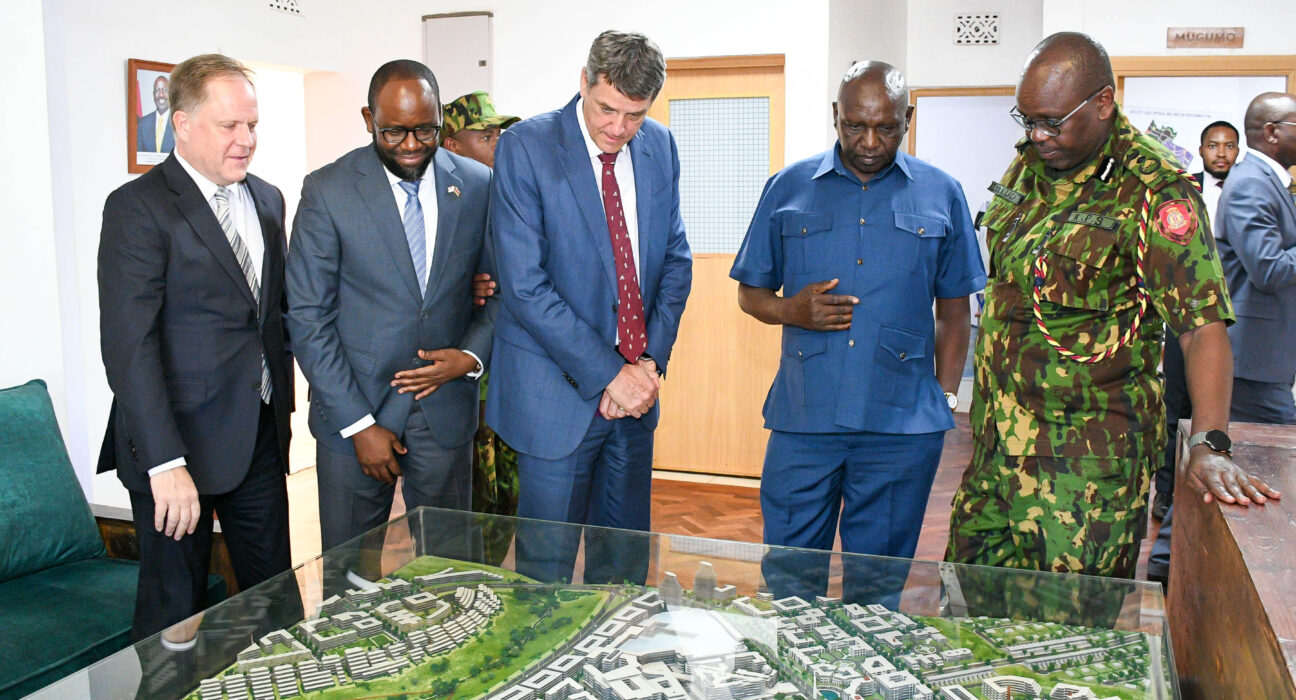Douglas Kanja Kirocho, the Inspector General of the National Police Service, recently visited Tatu City, Kenya’s prominent 5,000-acre mixed-use Special Economic Zone (SEZ) near Nairobi. This visit underscores the National Police Service’s commitment to safeguarding key developments like Tatu City, which is crucial to Kenya’s economic transformation.
During his visit, Inspector General Kanja toured Tatu City’s rapidly expanding development, which currently hosts over 80 businesses, alongside over 3,000 residents, 4,500 students, and a workforce of 20,000. As one of Kenya’s largest urban developments, Tatu City continues to attract both local and international investors, requiring a robust and proactive security approach.
A major stop on the tour was the newly established Tatu City Patrol Base, which serves to meet the security demands of this growing community and its neighboring areas. Deputy Inspector General Eliud Kipkoech Lagat committed to further strengthening the patrol base by increasing personnel and introducing a dedicated office to address Gender-Based Violence (GBV) cases—reflecting the National Police Service’s responsiveness to community-specific security needs.
Inspector General Kanja emphasized the significance of Tatu City’s security to Kenya’s broader economic landscape: “Tatu City is a key part of Kenya’s development and economic growth, and we recognise the importance of security in ensuring it continues to thrive. This visit is critical as we work together to safeguard the public, ensuring that Kenya remains an attractive destination for foreign investment and a secure environment for local businesses.”
Security, Infrastructure, and Growth: The Cornerstones of Tatu City’s Development
The need for comprehensive security solutions has grown alongside Tatu City’s rapid expansion. As a major Vision 2030 project, Tatu City is recognized as a project of Strategic National Importance under the 2019 Physical and Land Use Planning (Classification of Strategic and Inter-County Projects) Regulations. The National Police Service, through its Critical Infrastructure Protection Unit (CIPU), has been instrumental in securing the city’s essential infrastructure and utilities, an effort aligned with its mission to protect critical economic zones in Kenya.
The city’s unique open-plan design, free from traditional gated boundaries, enables a seamless movement of people and fosters economic interaction while maintaining a secure environment. This approach aligns with Tatu City’s goal of becoming a model for sustainable urban development, showing that infrastructure investments coupled with strong national security can attract foreign investment and contribute to Kenya’s growth.
Solomon Mahinda, Executive Vice President of Tatu City, highlighted the value of the National Police Service partnership: “The pace at which the city is growing has made us re-examine our approach to integrated solutions for development and security. We view the national security architecture as a critical component in attracting investment and ensuring the continued growth of Tatu City.”
Ensuring Safety for Sustainable Urban Growth
As Kenya’s urban landscape evolves, the Inspector General’s visit to Tatu City signifies a proactive approach to managing the security requirements of these rapidly growing areas. This focus on safety is essential as Tatu City continues to draw a steady influx of residents, businesses, and visitors, supported by both local and foreign investments.
In addition to securing businesses and residential areas, the new Tatu City Patrol Base will address specific community needs, such as gender-based violence. The National Police Service’s initiative to establish a dedicated office for GBV cases in Tatu City underlines its commitment to providing nuanced, community-oriented security services that address pressing issues within the community.
With this police-backed security infrastructure, Tatu City aims to bolster investor confidence and encourage more people to join this innovative urban community. As Kenya positions itself as a leader in modern African urban development, partnerships between local government and national security are essential to creating sustainable, secure, and economically vibrant cities.
Tatu City as a Flagship Vision 2030 Development
Tatu City’s significance in Kenya’s Vision 2030 strategy is evident not only in its strategic location near Nairobi but also in its approach to urban planning and economic inclusivity. Classified as a project of Strategic National Importance, Tatu City represents a forward-thinking approach to urban design and governance. By aligning with the National Police Service’s efforts, Tatu City reaffirms its role as a cornerstone of Kenya’s future-oriented economic agenda.
With developments like Tatu City, Kenya continues to advance its infrastructure goals, attracting a wide range of investors while ensuring that residents, workers, and visitors enjoy a secure environment. The Inspector General’s visit underscores the role of security as a foundational pillar in Kenya’s urban development, signaling a strong commitment to secure, sustainable growth.





